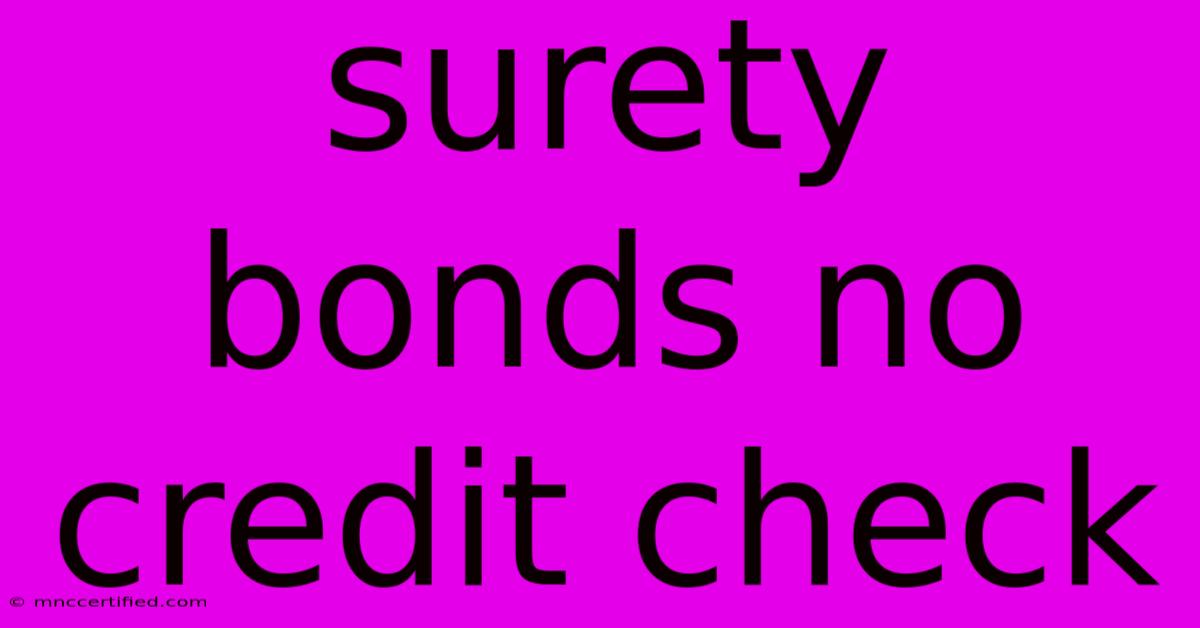Surety Bonds No Credit Check

Table of Contents
Surety Bonds: No Credit Check Options Explained
Finding yourself needing a surety bond but lacking stellar credit can feel daunting. Fortunately, securing a surety bond without a perfect credit history is entirely possible. This comprehensive guide explores the world of surety bonds, specifically focusing on options available even with less-than-perfect credit. We'll demystify the process and equip you with the knowledge to navigate it successfully.
What is a Surety Bond?
A surety bond isn't a loan; it's a three-party agreement involving a principal, a surety, and an obligee. The principal needs the bond to fulfill a contractual obligation or legal requirement. The surety company (like a guarantor) guarantees the principal's performance to the obligee (the entity requiring the bond). If the principal fails to meet their obligations, the surety company pays the obligee.
Key Players:
- Principal: The individual or business requiring the bond.
- Surety: The bonding company guaranteeing the principal's performance.
- Obligee: The party requiring the bond as protection.
Why Might I Need a Surety Bond with No Credit Check?
Many situations demand surety bonds, and your credit score shouldn't be a barrier. Common examples include:
- Contractors: Many states require contractors to obtain surety bonds to ensure they complete projects and pay subcontractors.
- License and Permits: Some licenses and permits necessitate surety bonds to guarantee compliance with regulations.
- Fiduciary Responsibilities: Individuals handling funds for others (e.g., executors of estates) may need bonds to protect beneficiaries.
- Court Bonds: Various legal proceedings may require surety bonds to secure court costs or ensure compliance with court orders.
Finding Surety Bonds with Limited Credit Checks: Is it Possible?
While a pristine credit report often leads to lower premiums, securing a surety bond with less-than-perfect credit is achievable. Several factors influence your eligibility and premium:
- Personal Finances: Surety companies assess your overall financial stability, including assets, income, and business history (if applicable).
- Business History: For business bonds, a successful track record significantly improves your chances.
- Type of Bond: The risk associated with the specific bond type impacts underwriting. Lower-risk bonds are often more readily available with less stringent credit requirements.
- Bond Amount: Smaller bond amounts generally present less risk and are easier to obtain.
Strategies for Obtaining a Surety Bond with Less-than-Perfect Credit:
- Work with a Surety Bond Specialist: Brokers specialize in connecting individuals with appropriate surety companies, often finding options tailored to specific credit situations. They can guide you through the process, increasing your chances of approval.
- Improve Your Financial Standing: Before applying, address any negative aspects of your credit report if possible. Paying down debts and improving your financial situation can significantly impact your eligibility.
- Provide Comprehensive Financial Documentation: Be prepared to provide detailed financial documentation, including tax returns, bank statements, and business records, to demonstrate your financial stability.
- Consider a Co-Signer: In some cases, a co-signer with strong credit can significantly increase your chances of approval.
Understanding Surety Bond Premiums and Costs
The cost of a surety bond is determined by several factors, including your credit score, the bond amount, and the risk associated with the specific bond type. While a higher credit score generally translates to lower premiums, individuals with less-than-perfect credit can still secure bonds; they might simply pay a higher premium.
Don't Let Credit Hold You Back: Take Action Today
Securing a surety bond, even with less-than-perfect credit, is achievable. By understanding the process, working with a specialist, and presenting a comprehensive financial picture, you can overcome credit hurdles and obtain the bond you need. Remember to research different surety bond providers and compare quotes to ensure you get the best possible deal. Your next step is to start gathering your financial documents and contacting a surety bond specialist. Don't delay—take control of your situation and get the bond you need.
Disclaimer: This article provides general information about surety bonds and should not be considered financial or legal advice. Consult with a qualified professional for personalized guidance.

Thank you for visiting our website wich cover about Surety Bonds No Credit Check. We hope the information provided has been useful to you. Feel free to contact us if you have any questions or need further assistance. See you next time and dont miss to bookmark.
Featured Posts
-
Sarabia Monterrey Borregos Quarterback
Nov 30, 2024
-
Coronation Street Battersby Murder Solved
Nov 30, 2024
-
College Football Predictions Ats
Nov 30, 2024
-
34 Ole Miss Seniors Honored
Nov 30, 2024
-
Bonded Materials Kailua Kona
Nov 30, 2024